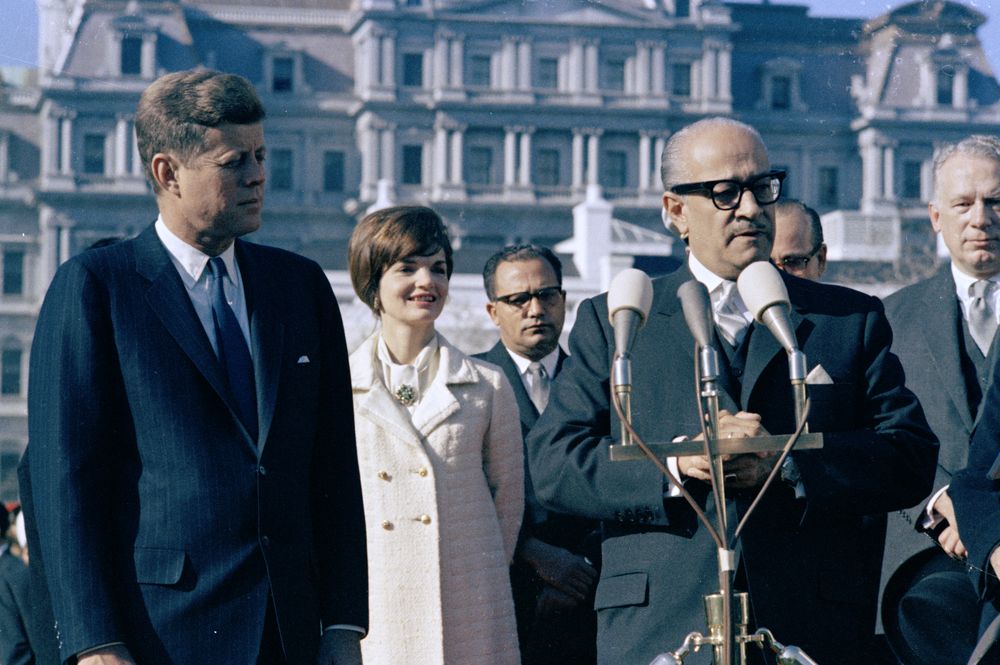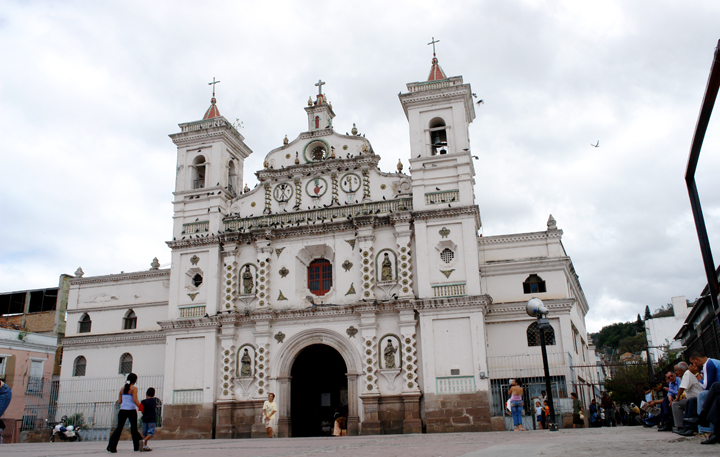|
1957 Honduran Presidential Election
Constituent Assembly elections were held in Honduras on 22 September 1957. Dieter Nohlen (2005) ''Elections in the Americas: A data handbook, Volume I'', p407 In November the Assembly elected Ramón Villeda Morales as president. Results Aftermath On 16 November the Assembly elected Ramón Villeda Morales as president by a vote of 37 to 20.John D. Martz (1959) ''Central America, the crisis and the challenge'', p161 Following his election, the Liberal Party formed a coalition government with the National Party and the National Reformist Movement, with cabinet portfolios divided on a 6:2:1 ratio.Robert MacCameron (1983) ''Bananas, labor and politics in Honduras: 1954-1963'', p94 However, the National Party and National Reformist Movement held protests in Tegucigalpa Tegucigalpa (, , ), formally Tegucigalpa, Municipality of the Central District ( es, Tegucigalpa, Municipio del Distrito Central or ''Tegucigalpa, M.D.C.''), and colloquially referred to as ''Tegus'' or ''Teguz'', ... [...More Info...] [...Related Items...] OR: [Wikipedia] [Google] [Baidu] |
Honduras
Honduras, officially the Republic of Honduras, is a country in Central America. The republic of Honduras is bordered to the west by Guatemala, to the southwest by El Salvador, to the southeast by Nicaragua, to the south by the Pacific Ocean at the Gulf of Fonseca, and to the north by the Gulf of Honduras, a large inlet of the Caribbean Sea. Its capital and largest city is Tegucigalpa. Honduras was home to several important Mesoamerican cultures, most notably the Maya, before the Spanish Colonization in the sixteenth century. The Spanish introduced Catholicism and the now predominant Spanish language, along with numerous customs that have blended with the indigenous culture. Honduras became independent in 1821 and has since been a republic, although it has consistently endured much social strife and political instability, and remains one of the poorest countries in the Western Hemisphere. In 1960, the northern part of what was the Mosquito Coast was transferred from Nicara ... [...More Info...] [...Related Items...] OR: [Wikipedia] [Google] [Baidu] |
Dieter Nohlen
Dieter Nohlen (born 6 November 1939) is a German academic and political scientist. He currently holds the position of Emeritus Professor of Political Science in the Faculty of Economic and Social Sciences of the University of Heidelberg. An expert on electoral system An electoral system or voting system is a set of rules that determine how elections and referendums are conducted and how their results are determined. Electoral systems are used in politics to elect governments, while non-political elections ma ...s and political development, he has published several books. IDEA Bibliography Books published by Nohlen include: *''Electoral systems of the world'' (in German, 1978) *''Lexicon of politics'' (seven volumes) *''Elections and Electoral Systems'' (1996) *''Electi ...[...More Info...] [...Related Items...] OR: [Wikipedia] [Google] [Baidu] |
Ramón Villeda Morales
José Ramón Adolfo Villeda Morales (November 26, 1909 – October 8, 1971) served as President of Honduras from 1957 to 1963. He was also known by the nickname, "Pajarito". Biography Trained as a physician, his specialty was pediatrics. Villeda Morales was a liberal who supported the democratization of Honduras after a long period of military rule. He was the Liberal Party candidate in the 1954 presidential election, the first free election for over two decades, winning a plurality over a divided National Party but falling short of a majority. The deadlock led to a coup by Vice-President Julio Lozano Díaz. Following the military junta of 1955, he was in 1957 chosen by the country's constituent assembly to serve as president and oversee the transition to democracy. Villeda Morales immediately embarked on a campaign which he believed would help the poorer elements of society, introducing welfare benefits and enacting a new labor code that favored the country's large wor ... [...More Info...] [...Related Items...] OR: [Wikipedia] [Google] [Baidu] |
Liberal Party Of Honduras
The Liberal Party of Honduras (Spanish: ''Partido Liberal de Honduras)'' is a centrist liberal political party in Honduras that was founded in 1891. It is the oldest extant political party in the country, and one of the two main parties that have until recently dominated Honduran politics. The party is a member of the Liberal International. The PLH is identified with the colours red and white, as the flag Francisco Morazán used in most of his military campaigns during time of the Central American Federal Republic. The party is against the legalisation of abortion, which is punishable by imprisonment in Honduras. 2001 elections At the legislative elections, held on 25 November 2001, the party won 40.8% of the popular vote and 55 out of 128 seats in Congress. Its candidate at the presidential elections, Rafael Pineda Ponce won 44.3%, but was defeated by Ricardo Maduro of the National Party of Honduras. 2005 elections The PLH won the closely contested 2005 presidential race, ... [...More Info...] [...Related Items...] OR: [Wikipedia] [Google] [Baidu] |
National Party Of Honduras
The National Party of Honduras (PNH; es, Partido Nacional de Honduras) is a conservative political party in Honduras founded on 27 February 1902, by Manuel Bonilla Chirinos. Historically it has been one of the two most influential parties in the country. The party's platform is based on Christian humanist doctrine, and its five main principles are common wealth, dignity of the human person, equality, solidarity and subsidiarity. Since the foundation of the National Party, Honduras has had 13 PNH presidents. Manuel Bonilla was the first (1903–1907), and the most recent is the president, Juan Orlando Hernández who served from 2014 to 2022. The party was the ruling directive of the National Congress from 2009 to 2022 and currently holds the most of the country's municipalities. History The ideology of the party can be traced back to national hero José Trinidad Cabañas's principles and thinking. Cabañas believed in a strong sense of patriotism, and that national interest wa ... [...More Info...] [...Related Items...] OR: [Wikipedia] [Google] [Baidu] |
National Reformist Movement
National may refer to: Common uses * Nation or country ** Nationality – a ''national'' is a person who is subject to a nation, regardless of whether the person has full rights as a citizen Places in the United States * National, Maryland, census-designated place * National, Nevada, ghost town * National, Utah, ghost town * National, West Virginia, unincorporated community Commerce * National (brand), a brand name of electronic goods from Panasonic * National Benzole (or simply known as National), former petrol station chain in the UK, merged with BP * National Car Rental, an American rental car company * National Energy Systems, a former name of Eco Marine Power * National Entertainment Commission, a former name of the Media Rating Council * National Motor Vehicle Company, Indianapolis, Indiana, USA 1900-1924 * National Supermarkets, a defunct American grocery store chain * National String Instrument Corporation, a guitar company formed to manufacture the first resonator g ... [...More Info...] [...Related Items...] OR: [Wikipedia] [Google] [Baidu] |
Tegucigalpa
Tegucigalpa (, , ), formally Tegucigalpa, Municipality of the Central District ( es, Tegucigalpa, Municipio del Distrito Central or ''Tegucigalpa, M.D.C.''), and colloquially referred to as ''Tegus'' or ''Teguz'', is the capital and largest city of Honduras along with its sister city, Comayagüela. Claimed on 29 September 1578 by the Spaniards, Tegucigalpa became the country's capital on October 30, 1880, under President Marco Aurelio Soto, when he moved the capital from Comayagua. The Constitution of Honduras, enacted in 1982, names the sister cities of Tegucigalpa and Comayagüela as a Central District to serve as the permanent national capital, under articles 8 and 295. After the dissolution of the Federal Republic of Central America in 1841, Honduras became an individual sovereign nation with Comayagua as its capital. The capital was moved to Tegucigalpa in 1880. On January 30, 1937, Article 179 of the 1936 Honduran Constitution was changed under Decree 53 to establish Te ... [...More Info...] [...Related Items...] OR: [Wikipedia] [Google] [Baidu] |
Elections In Honduras
Honduras National Congress has 128 members (diputados); they serve four-year terms. Honduras elects on national level a head of state – the president – and a legislature. The President of Honduras is elected for a four-year term by the people by a simple majority of valid votes (nulls and blanks excluded). The unicameral National Congress ''(Congreso Nacional)'' has 128 members ''(diputados),'' elected for four-year term by proportional representation to represent the country's various departments. Honduras' presidential elections are held on the last Sunday of November of the election year. Honduras has a multi-party system, but used to have a two-party system, which means that there were two dominant political parties: the Liberal Party of Honduras (PLH) and the National Party of Honduras (PNH). Ahead of the 2013 general election various new parties emerged as contenders for power and influence. Elections in Honduras gives information on elections and election ... [...More Info...] [...Related Items...] OR: [Wikipedia] [Google] [Baidu] |
1957 Elections In Central America
1957 (Roman numerals, MCMLVII) was a Common year starting on Wednesday, common year starting on Tuesday of the Gregorian calendar, the 1957th year of the Common Era (CE) and ''Anno Domini'' (AD) designations, the 957th year of the 2nd millennium, the 57th year of the 20th century, and the 8th year of the 1950s decade. Events January * January 1 – The Saarland joins West Germany. * January 3 – Hamilton Watch Company introduces the first electric watch. * January 5 – South African player Russell Endean becomes the first batsman to be Dismissal (cricket), dismissed for having ''handled the ball'', in Test cricket. * January 9 – British Prime Minister Anthony Eden resigns. * January 10 – Harold Macmillan becomes Prime Minister of the United Kingdom. * January 11 – The African Convention is founded in Dakar. * January 14 – Kripalu Maharaj is named fifth Jagadguru (world teacher), after giving seven days of speeches before 500 Hindu scholars. * January 15 – The film ' ... [...More Info...] [...Related Items...] OR: [Wikipedia] [Google] [Baidu] |
1957 In Honduras
1957 (Roman numerals, MCMLVII) was a Common year starting on Wednesday, common year starting on Tuesday of the Gregorian calendar, the 1957th year of the Common Era (CE) and ''Anno Domini'' (AD) designations, the 957th year of the 2nd millennium, the 57th year of the 20th century, and the 8th year of the 1950s decade. Events January * January 1 – The Saarland joins West Germany. * January 3 – Hamilton Watch Company introduces the first electric watch. * January 5 – South African player Russell Endean becomes the first batsman to be Dismissal (cricket), dismissed for having ''handled the ball'', in Test cricket. * January 9 – British Prime Minister Anthony Eden resigns. * January 10 – Harold Macmillan becomes Prime Minister of the United Kingdom. * January 11 – The African Convention is founded in Dakar. * January 14 – Kripalu Maharaj is named fifth Jagadguru (world teacher), after giving seven days of speeches before 500 Hindu scholars. * January 15 – The film ' ... [...More Info...] [...Related Items...] OR: [Wikipedia] [Google] [Baidu] |


